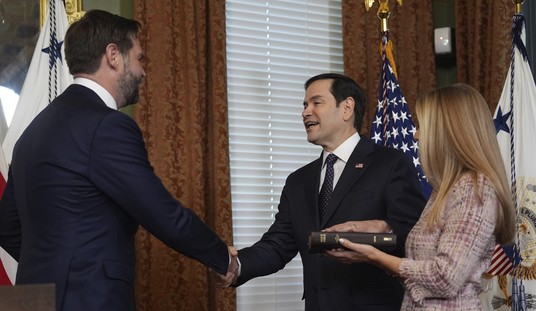A leftover from the Tucker interview last night. Background: Not only was Montenegro admitted into NATO on Trump’s watch, the guy who reportedly lobbied him on agreeing to it was Mike Flynn. He was the national security advisor for five minutes but one of the things he did in those five minutes was push to expand NATO. That’s always been one of the low-key most compelling counterarguments to me that he’s some sort of pro-Russian stooge. At a minimum, you would think a Putin flunky would be working on shrinking NATO, not building it out. In any case, watch, then read on:
The U.S. doesn’t pay 90 percent of Europe’s defense costs, contra what Trump says. It pays 22 percent of NATO’s budget, which is still more than it should but the true figure undermines the resentment at NATO that he’s trying to nurture by implying that nearly all costs are borne by U.S. taxpayers. The Europeans are total free-riders! They aren’t. They ride at a deep discount, and he’s right to want to change that, but collectively they provide the bulk of NATO funding.
Second, Tucker has used the line before that he uses here to criticize NATO, asking why his son should have to die for Montenegro. Alex Griswold imagined the 1941 version of that:
https://twitter.com/HashtagGriswold/status/1019566255034990592
“Putin’s not Hitler,” you might reply. True, but the U.S. military of 2018 isn’t the U.S. military of 1941 either. There’s no draft, there hasn’t been one for years, there’s zero prospect of the two parties bringing one back barring a direct attack on the U.S. mainland that would drive public support for war high enough to make reinstituting the draft politically safe. If 9/11 wasn’t enough to do it, try to imagine a semi-plausible scenario that would. Tucker’s kid stands zero chance of dying for Montenegro unless he chooses to enlist, knowing America’s NATO commitments when he does. If he’s worried about his son dying for Montenegro, he should talk to his son about it, not the president.
It’s more likely, in fact, that a Montenegrin’s son will risk dying for the U.S. than vice versa. They already risk it:
From February: Montenegro to increase troop presence in Afghanistan, per request of US. https://t.co/T1r3kkWElQ
— Jake Tapper (@jaketapper) July 18, 2018
One can debate treaties and the Western alliance, I suppose, but if folks are wondering why Americans should defend Montenegro, know that Montenegrins are fighting in the US war in Afghanistan because we were attacked on 9/11. In other words — they’re already defending us. https://t.co/tVPdlUsQqU
— Jake Tapper (@jaketapper) July 18, 2018
Their force in Afghanistan is very small, just a few dozen troops, but it’s a small country (population 650,000 or so) and they’ve been participating in missions for years, long before they were formally admitted to NATO. If Trump resents being obliged to defend a country whose membership in the alliance was supported by his own administration, the least he could do is send their troops home from “our” conflict. As a million different people noted last night on social media after the Tucker interview, the one and only time NATO has invoked the Article 5 provision requiring collective defense wasn’t after Russia moved against the Baltics, it was after Al Qaeda moved against the United States.
The strangest part, though, is Trump’s aside about Montenegrins being “very aggressive.” He tries to frame that as a positive thing, explaining it as a matter of strength — they’re a strong people, therefore “aggressive.” (It’s interesting that he’d conflate those two concepts.) But the point he’s trying to make is negative, that because Montenegro is allegedly so aggressive, you never know whether they might make a move on one of their neighbors, thereby embroiling the U.S. in the conflict under the NATO treaty. Again: This is a country of less than a million people that sought NATO membership for one reason, to protect itself from invasion by the nuclear superpower Russia. (Russia’s already tried more subtle ways of interfering there.) The idea of Montenegro getting “aggressive” with Moscow is farcical, the sort of thing you can imagine Putin mentioning in his meeting with Trump just to see if Trump would bite on it and repeat it. That’s not to say that’s what happened, but it is to say that the only place you’d see the idea of Montenegrin aggression treated semi-seriously is on Russian state TV.
Trump’s complaints about NATO since becoming president are usually framed in terms of expenditures — we’re paying too much, they’re paying too little. He focuses on that here too, but Carlson is less interested in the bean-counting than in the underlying rationale for the alliance. Who cares who’s paying what share? Why is America still involved 30 years after the Soviet crack-up? Trump obviously agrees, although he was more vocal about it before assuming office. This is why hawks get anxious when he complains about the cost-sharing burdens of NATO even though the numbers justify his concerns: Between his endless grumbling about the organization (and the EU) and his repeated wishes for better relations with Russia, his objection to the alliance seem to have less to do with money than with the fact that it exists at all. Money and “unfairness” is just a way to undermine broader support for it. He doesn’t want the United States obliged to defend far-flung countries in the name of deterring Russian expansionism despite the fact that that’s the whole point of NATO and it’s been amazingly successful at achieving its goal over Trump’s lifetime.
Which leaves you to wonder: What’s the point of him complaining publicly about it all the time without doing anything meaningful to withdraw from it? If he wants to complain privately about costs but defend the alliance publicly, that’s understandable. (Commendable, I’d say.) If he wants to withdraw altogether, that’d be disastrous for Europe and longer-term for the U.S. but at least there’d be clarity about his policy. And it’d give Europe some time to make alternate plans about mutual defense, whether via “NATO without the U.S.” or some new alliance. Hinting constantly, though, that he’s not really committed to NATO while remaining formally involved and supportive is provocative insofar as it invites Putin to test his resolve. What would happen if Russia made a move on Montenegro? Would Trump refuse to honor America’s Article 5 obligations? I doubt Merkel and Macron and May feel confident that they know the answer. How do you plan for defense under those circumstances? Or is that the point — that Trump’s trying to make NATO untenable in its current form due to uncertainty and hoping that other members will exit before he does? That seems to be his approach with problematic personnel like Jeff Sessions, hoping he can make life miserable enough for them that they’ll quit before he fires them. Maybe it’s his foreign policy approach too.








Join the conversation as a VIP Member